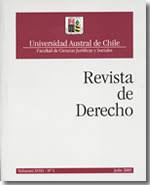IMPARCIALIDAD DEL TRIBUNAL ORAL EN LO PENAL: TRAS LA CONQUISTA DE LA GARANTÍA
Contenido principal del artículo
Resumen
Controlar la indiferencia judicial, las amenazas de prejuicio del juzgador y garantizar a los acusados niveles adecuados de confianza en la neutralidad del juez, constituyen los aspectos del juicio oral que mayores dificultades plantean al litigante. No sólo en cuanto al contenido y alcance de la garantía de imparcialidad del tribunal asegurada en el primer artículo del Código Procesal Penal, sino también respecto del procedimiento y oportunidad de alegar su transgresión. Aquí se esboza una dimensión subjetiva de la misma, pero también de protección de las apariencias de neutralidad; se analizan algunos incidentes surgidos de la práctica forense y se distinguen los procedimientos de cautela de esta garantía de aquellos reparatorios o represivos de su infracción, evitando así una confusión conceptual que a menudo ha creado desinteligencias argumentativas y decisiones insatisfactorias.

